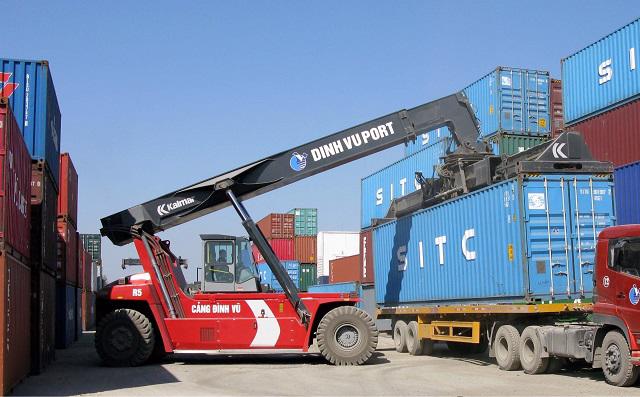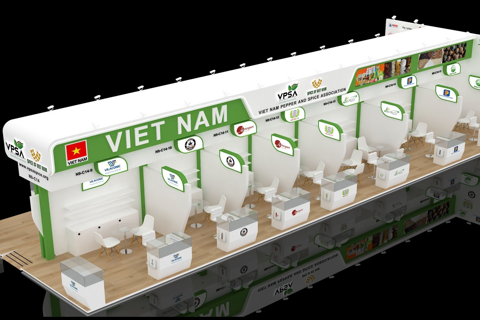Red River delta to become logistics hub in Southeast Asia
The region is home to 26 logistics centers or 35% of the total nationwide.
The Red River delta holds huge potential to be one of Southeast Asia’s major logistics hubs, contributing to the rapid and sustainable development of Vietnam’s Northern region, according to a report from the Ministry of Industry and Trade (MoIT).
| Cargo handling at Dinh Vu Port, Haiphong. Photo: Hai Linh |
Vietnam currently has 75 logistics centers in 16 out of 63 provinces/cities. The Red River delta is home to 26 centers or 35% of the total nationwide.
“There have been major improvements in transport infrastructure over the years, which help bolster connectivity among localities and subsequently the competitiveness of the Northern region,” said the report.
In this regard, the Haiphong – Ha Long expressway has played a key role in connecting the three main growth drivers, namely Hanoi, Haiphong, and Quang Ninh.
“Comprehensive development in transport infrastructure would lay the foundation for the development of logistics services in the coming time,” it added.
To date, the region boasts several large-scale logistics ports at major gateways, such as the Thanh Dat Inland Container Depot (ICD) (Mong Cai City) in an area of 100 hectares; the logistics center of the Hoanh Mo – Dong Van Border Gate Economic Zone with over 27.3 hectares.
Hanoi alone has two ICDs, namely the ICD My Dinh and ICD Gia Lam, to support import-export activities.
Meanwhile, the ICD Tien Son in the northern province of Bac Ninh is located in a strategic area with linkage to industrial parks in Hanoi, Bac Ninh, Thai Nguyen, and Vinh Phuc via national highways, while the Yusen Dinh Vu Logistics Center in the port city of Haiphong was launched in 2014 in an area of nearly 100,000 square meters.
The Lach Huyen International Port in Haiphong serves a key role in Vietnam’s seaport network by meeting the growing demand for cargos loading and dispatching to other provinces/cities in the North, especially the economic triangle of Hanoi, Haiphong, and Quang Ninh.
From Lach Huyen Port, containers could go straight to European and American markets without having to transit through other ports in Asia, such as Singapore or Hong Kong, and therefore would lower transport costs significantly.
Higher quality in planning for logistics development
While the Red River delta holds huge potential for logistics development, the region is facing increasingly land constraints for the construction of warehouses, transshipment hub, or logistics centers.
“There has been a lack of clear vision for investment in logistics infrastructure across localities to form a complete and well-connected transport network,” noted the MoIT.
The ministry, therefore, expected higher quality in planning and implementation to push for the development of logistics services in the region.
“Logistics is an inevitable trend to ensure rapid and sustainable development in years to come,” it added.
Each province/city should map out an action plan to call for investment into economic-socio infrastructure from countries and partners that are having ongoing investment projects in Vietnam, said the report.
In the meantime, the Government continues to diversify financial resources to invest in infrastructure, especially in transportation and industrial parks to facilitate the movement of goods.
“More available land funds are required for the Red River delta to attract multinationals and international logistics companies to come,” said the MoIT, noting the move would help turn the region into a logistics hub of Southeast Asia and the world.
According to the MoIT, the Government is expected to revise regulations to ensure a favorable legal environment for logistics development, and simplify administrative procedures and business conditions to enhance the competitiveness of localities in the Red River delta.
Hanoi aims to become one of the top three biggest logistics hubs in Vietnam and the region. By 2025, the logistics sector would contribute 9-11% of the GRDP with an average growth rate of 17-21%, while logistics costs are expected to go down to 14-17% of the GRDP as the rate of logistics outsourcing would be reduced to 50-60%. The city enjoys a strategic advantage as it stands at the heart of the northeast region and serves as the country’s gateway to the world. |



![[Longform] South Korean investors keen on Vietnamese property and logistics](https://cdn-media.hanoitimes.vn/2022/07/21/cover_South_Korean_21_7s.jpg?w=480&h=320&q=100)








